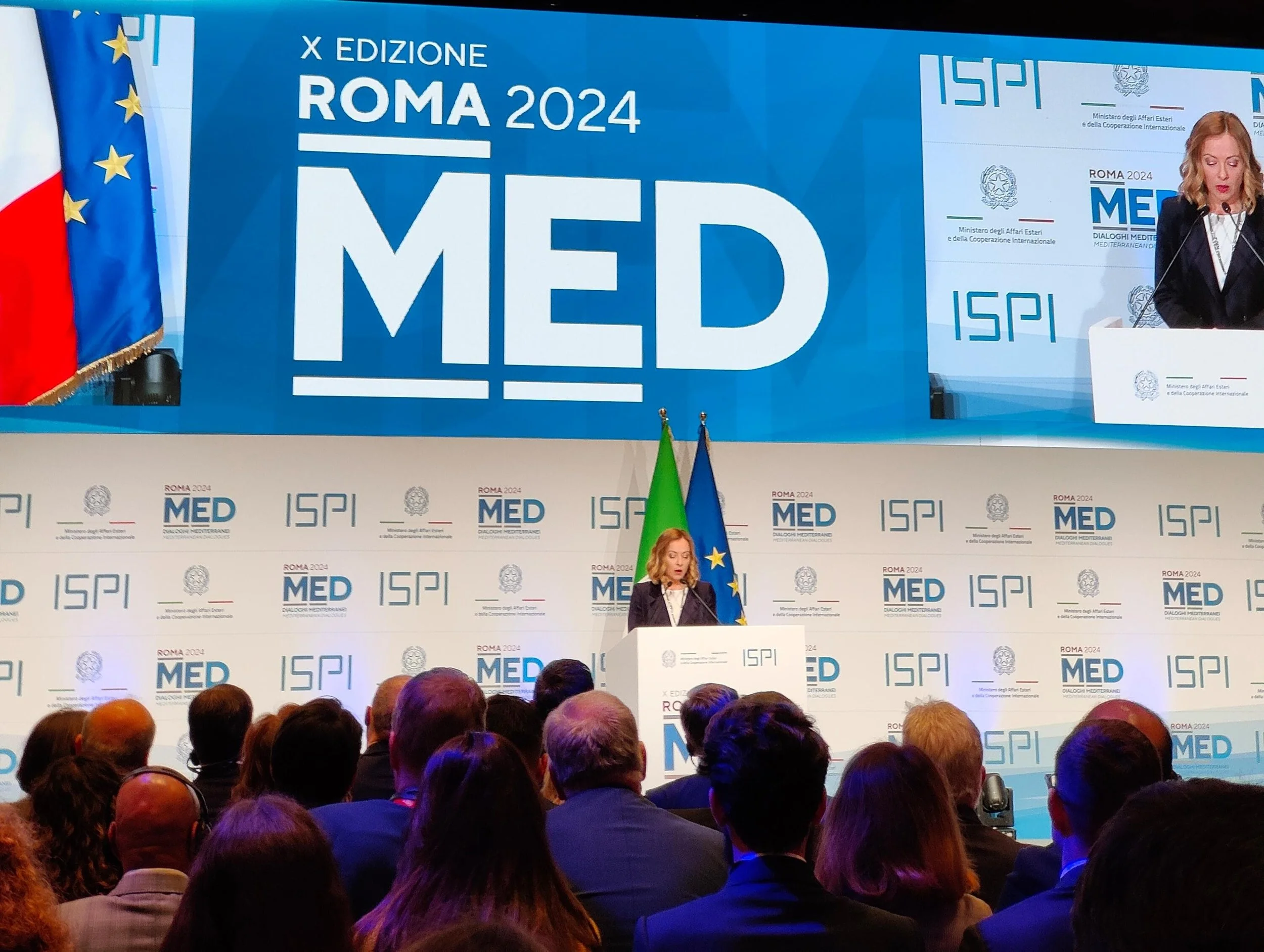Rome MED Dialogues 2024: Italy’s Geopolitical Ambitions for the “Enlarged Mediterranean”
05 December 2024
Rome MED Dialogues is an international conference bringing together political and institutional representatives to discuss key issues for the Mediterranean and to improve intra-regional cooperation. Our Co-Director Marco Garzia reflects on his attendance, summarising this year's debates.
Summary
Rome MED Dialogues 2024 focused on maritime security, interconnectivity and regional conflicts. They envisioned an “enlarged Mediterranean” spanning Gibraltar to India, with the India-Middle East-Europe Economic Corridor (IMEC) in the spotlight.
Under Meloni’s leadership, Italy has tried to showcase itself as a Mediterranean power and international peace broker, emphasising infrastructure projects and migration strategies rooted in cooperation with Africa and the Balkans.
Panels and speeches highlighted Italy’s support for Western Balkan EU accession, where migratory pressures, the de-escalation of regional conflicts and a two-state solution to the Israeli-Palestinian conflict were discussed.
The 10th edition of Rome MED Dialogues focused largely on the Mediterranean region, experiencing extensive participation of high-calibre policymakers from the EU, the Maghreb, the Near and Middle East, and India. What transpired largely reflects the ambitions of President Meloni’s government, particularly concerning its strategy for the African continent. This highly significant event hints at broader geopolitical shifts that will involve what was defined as the “enlarged Mediterranean”.
This year’s central concept has been ‘interconnectivity’, particularly concerning security issues that impact maritime supply chains. This has led to the concept, of the “enlarged Mediterranean” forming, an area that spans from Gibraltar to the Indian subcontinent. Subsequently, many discussions involved addressing the shipping routes that serve as lifelines to the wider region. Moreover, India’s presence was particularly notable throughout the event, as the country recently launched a broader strategy to expand its reach through trade via the upcoming India–Middle East–Europe Economic Corridor (IMEC), creating an alternative trade route to the widely used Suez Canal. In line with this, much interest was directed to the conflicts currently affecting the Near and Middle East, regarding the continued Houthi attacks hampering naval traffic on current shipping routes alongside the conflict affecting the Levant.
Italy took centre stage as is customary for Prime Minister Meloni’s leadership. Under her leadership, the country strives to reassert its role, not only as an international peace broker and a core component of global peacekeeping, but as a leading power in the Mediterranean. Whether these ambitions will endure beyond the current administration, given Italy’s notorious political instability, remains uncertain. However, one thing is clear: the Rome MED Dialogues provided the perfect platform to showcase Italy’s foreign policy priorities. This was evident in the event’s last two high-profile panels, one centring on the Western Balkans and the other featuring a conclusive speech by Prime Minister Meloni.
In front of numerous ministers from the Western Balkans countries, Minister of Foreign Affairs Antonio Tajani confirmed Italy’s commitment to economic and security cooperation and its assistance in their EU accession process. The region’s importance to Italy, particularly as part of its broader strategy to handle irregular migratory flows is evident. A few months following the plan to externalise the processing of asylum seekers to Albania, these commitments hint that Rome’s interest in the region may be linked to future attempts at partially outsourcing the burden of irregular migration to Western Balkan countries.
Besides describing Italy’s infrastructure projects to become the central pivot for energy and commerce between Africa, the Middle East and Europe, Meloni’s speech, discussed the country’s strategies to alleviate the pressure exerted by migratory flows on the continent. Strategies that although not extensively detailed, will be based on “the right not to migrate” and will be characterised by “cooperation as equals, not predatory, not charitable”, having the goal of increasing Africa’s wealth and stability by leveraging synergies between European plans homologous to Italy’s “Mattei Plan”. The speech concluded with a focus on conflict, highlighting Italy’s commitment to fostering progressive de-escalation in the Middle East, alongside its commitment to a two-state solution for the Israeli-Palestinian conflict.
Forecast
Short-term
Ongoing strategic initiatives, namely the “Mattei Plan”, the ELMED submarine power line with Tunisia and the South H2 Corridor for hydrogen between North Africa and Europe are unlikely to suffer major disruptions due to ongoing regional conflicts.
Medium-term
If not challenged by unforeseen political instability, Meloni’s government, is likely to push for initiatives enhancing Italy’s importance in international commerce and energy transport, leveraging Italy’s strategic position as the Southernmost point of access to European markets.
Italy is likely to maintain a diplomacy-oriented posture concerning ongoing conflicts on Mediterranean shores while participating in joint security initiatives along maritime trading routes.
Italy will likely assist and facilitate the EU accession process for Western Balkan countries.
Long-term
India’s influence on the Mediterranean region is likely to increase, potentially capitalising on the West’s gradual economic shift from China.

